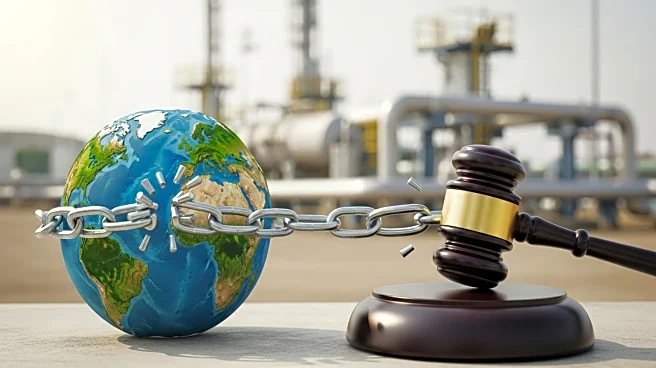What is the story about?
What's Happening?
Belgian police have successfully ended a Greenpeace blockade at the Zeebrugge LNG terminal after 29 hours. The protest involved approximately 70 activists using small boats, kayaks, and inflatables to surround the Greenpeace vessel Witness. The demonstration was strategically timed to coincide with the departure of an LNG carrier from the terminal operated by Fluxys. Greenpeace's protest aimed to highlight the ongoing EU discussions about sanctions against Russia, specifically calling for an end to Russian gas imports. Additionally, Greenpeace is advocating for a halt to U.S. LNG imports, urging Europe to phase out fossil gas supply contracts by 2035. Despite the blockade, Fluxys reported that the terminal continued to operate normally, although vessel traffic was disrupted.
Why It's Important?
The Greenpeace protest underscores the growing tension between environmental advocacy groups and the fossil fuel industry. By targeting LNG imports, Greenpeace is challenging the reliance on fossil fuels and pushing for a transition to renewable energy sources. The protest also highlights the broader geopolitical implications of energy supply, as Europe navigates sanctions against Russia while balancing its energy needs. The disruption caused by the blockade could have economic implications, affecting the timely delivery of LNG and potentially influencing market prices. The incident reflects the ongoing debate over energy policy and the role of environmental activism in shaping public discourse and policy decisions.
What's Next?
Following the removal of the blockade, Greenpeace has vowed to continue its campaign against fossil fuel reliance. The organization may plan further protests or engage in lobbying efforts to influence policy changes. The EU's discussions on sanctions against Russia and the future of LNG imports will likely continue, with potential impacts on energy policy and international relations. Stakeholders, including energy companies and policymakers, will need to address the concerns raised by environmental groups while ensuring energy security and economic stability. The incident may prompt increased dialogue between activists and industry leaders to find sustainable solutions.
Beyond the Headlines
The Greenpeace protest at the Zeebrugge LNG terminal raises ethical questions about the balance between environmental activism and economic interests. It highlights the tension between immediate energy needs and long-term sustainability goals. The protest also reflects broader cultural shifts towards environmental consciousness and the growing influence of grassroots movements in shaping public policy. As climate change becomes an increasingly urgent issue, such actions may become more frequent, challenging traditional energy paradigms and prompting a reevaluation of global energy strategies.
















